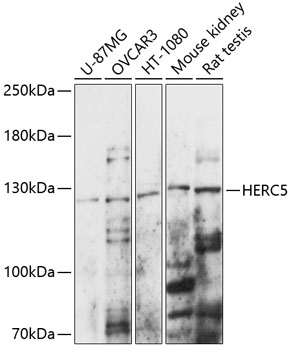-
Product Name
HERC5 Polyclonal Antibody
- Documents
-
Description
Polyclonal antibody to HERC5
-
Tested applications
WB
-
Species reactivity
Human, Mouse, Rat
-
Alternative names
HERC5 antibody; CEB1 antibody; CEBP1 antibody; E3 ISG15--protein ligase HERC5 antibody
-
Isotype
Rabbit IgG
-
Preparation
Antigen: Recombinant fusion protein containing a sequence corresponding to amino acids 360-700 of human HERC5 (NP_057407.2).
-
Clonality
Polyclonal
-
Formulation
PBS with 0.02% sodium azide, 50% glycerol, pH7.3.
-
Storage instructions
Store at -20℃. Avoid freeze / thaw cycles.
-
Applications
WB 1:500 - 1:2000
-
Validations

Western blot - HERC5 Polyclonal Antibody
Western blot analysis of extracts of various cell lines, using HERC5 antibody at 1:1000 dilution.Secondary antibody: HRP Goat Anti-Rabbit IgG (H+L) at 1:10000 dilution.Lysates/proteins: 25ug per lane.Blocking buffer: 3% nonfat dry milk in TBST.Detection: ECL Basic Kit .Exposure time: 30s.
-
Background
Major E3 ligase for ISG15 conjugation. Acts as a positive regulator of innate antiviral response in cells induced by interferon. Functions as part of the ISGylation machinery that recognizes target proteins in a broad and relatively non-specific manner. Catalyzes ISGylation of IRF3 which results in sustained activation, it attenuates IRF3-PIN1 interaction, which antagonizes IRF3 ubiquitination and degradation, and boosts the antiviral response. Catalyzes ISGylation of influenza A viral NS1 which attenuates virulence; ISGylated NS1 fails to form homodimers and thus to interact with its RNA targets. Catalyzes ISGylation of papillomavirus type 16 L1 protein which results in dominant-negative effect on virus infectivity. Physically associated with polyribosomes, broadly modifies newly synthesized proteins in a cotranslational manner. In an interferon-stimulated cell, newly translated viral proteins are primary targets of ISG15.
Related Products / Services
Please note: All products are "FOR RESEARCH USE ONLY AND ARE NOT INTENDED FOR DIAGNOSTIC OR THERAPEUTIC USE"
